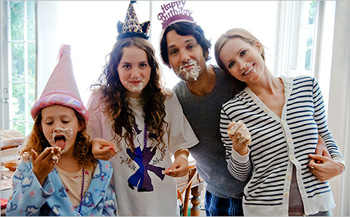The 400-Word Review: This Is 40
By Sean Collier
December 22, 2012
BoxOfficeProphets.com

While these choices are brave, they’re also what make some of Apatow’s films a chore to watch.
Paul Rudd and Leslie Mann, reprising their roles from Knocked Up (still Apatow’s best directorial effort), have the normal emotional problems of people without, ya know, real problems: they’re unsure in their marriage, shaky in their careers, and petrified of their offspring and their own parents. They navigate the film like bumper cars — they smack into one another, get distracted long enough to pursue something else, then smack into one another again moments later.
There is no particular obstacle for the couple to face, and that’s what prevents This Is 40 from falling into a simplistic structure. But as much as that’s refreshing, it’s boring, too; without any real drive to the story, the film is a bunch of episodic and ultimately meaningless incidents. When we finally reach the conclusion (after a bloated 134 minutes), it isn’t quite clear why the result of the ultimate marital spat is any more significant than the four or five we’ve already seen.
This Is 40 is saved — as are all Apatow productions, at one level or another — by the all-star cast of funny performers employed. Rudd is his charming self, and Mann (Apatow’s real-life wife) remains one of the most underrated comedic performers in Hollywood. Jason Segel, also reprising his Knocked Up role, steals scenes. Albert Brooks, as the helpless father of Rudd’s character, gives the film much of its second-half drive. Melissa McCarthy, Megan Fox, Charlyne Yi, Lena Dunham, Chris O’Dowd and Annie Mumolo all distinguish themselves. (The decision to cast Apatow’s real-life children, Sadie and Charlotte, as central characters isn’t disastrous, but the film probably could’ve been better served by more experienced performers.)
So it’s certainly funny. But it’s also blatantly over-indulgent, in a half-dozen ways. Apatow’s humor and perspective have redefined big-screen comedy in the 21st century. Perhaps, though, it’s time for the auteur to become more of a collaborator and less of a visionary.